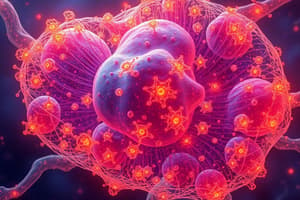Podcast
Questions and Answers
Which structure is most likely to have a double membrane?
Which structure is most likely to have a double membrane?
- Mitochondrion (correct)
- Lysosome
- Plasma membrane
- Nucleus
What type of ribosomes are found in mitochondria?
What type of ribosomes are found in mitochondria?
- 70S (correct)
- 60S
- 50S
- 80S
What is the process by which mitochondria reproduce?
What is the process by which mitochondria reproduce?
- Endocytosis
- Binary fission (correct)
- Mitosis
- Meiosis
What is the term for the theory that mitochondria evolved from free-living prokaryotes?
What is the term for the theory that mitochondria evolved from free-living prokaryotes?
What is unique about the DNA of mitochondria?
What is unique about the DNA of mitochondria?
What is the function of the mitochondrial inner membrane?
What is the function of the mitochondrial inner membrane?
What is the characteristic of the plasma membrane in a prokaryotic cell?
What is the characteristic of the plasma membrane in a prokaryotic cell?
What is the function of the pili in a prokaryotic cell?
What is the function of the pili in a prokaryotic cell?
What is the location of the DNA in a prokaryotic cell?
What is the location of the DNA in a prokaryotic cell?
What is the function of the 70S ribosomes in a prokaryotic cell?
What is the function of the 70S ribosomes in a prokaryotic cell?
What is NOT a characteristic of a prokaryotic cell?
What is NOT a characteristic of a prokaryotic cell?
What is the function of flagella in prokaryotes?
What is the function of flagella in prokaryotes?
What is the main function of the nucleus in eukaryotic cells?
What is the main function of the nucleus in eukaryotic cells?
What is the main component of the cell wall in plant cells?
What is the main component of the cell wall in plant cells?
What is the function of the endoplasmic reticulum in eukaryotic cells?
What is the function of the endoplasmic reticulum in eukaryotic cells?
Which organelle is responsible for generating energy in eukaryotic cells?
Which organelle is responsible for generating energy in eukaryotic cells?
What is the size of ribosomes in eukaryotic cells?
What is the size of ribosomes in eukaryotic cells?
Flashcards are hidden until you start studying
Study Notes
Cell Structures
- Mitochondria, chloroplasts, and nuclei are structures that have a double membrane.
Mitochondrial Ribosomes
- Mitochondria have their own ribosomes, which are called 70S ribosomes.
Mitochondrial Reproduction
- Mitochondria reproduce independently through a process called binary fission.
Endosymbiotic Theory
- The endosymbiotic theory explains the origin of mitochondria and chloroplasts. It suggests that these organelles were once free-living prokaryotes that were engulfed by other cells and evolved into their present-day forms.
Mitochondrial DNA
- Mitochondrial DNA (mtDNA) is circular and has its own set of genes, separate from the cell's nuclear DNA. It is also inherited maternally.
Mitochondrial Inner Membrane
- The inner membrane of the mitochondria contains a series of folds called cristae, which increase the surface area for ATP production.
Prokaryotic Plasma Membrane
- The plasma membrane of a prokaryotic cell is a phospholipid bilayer that regulates the passage of molecules into and out of the cell.
Prokaryotic Pili
- Pili are hair-like structures found on the surface of prokaryotic cells. They are often involved in attachment to surfaces, conjugation (transfer of genetic material between bacteria), and motility.
Prokaryotic DNA
- Prokaryotic DNA is located in a region called the nucleoid, which is not enclosed by a membrane.
Prokaryotic 70S Ribosomes
- 70S ribosomes are essential for protein synthesis in prokaryotic cells.
Prokaryotic Cell Characteristics
- Prokaryotic cells lack a nucleus, membrane-bound organelles, and a cytoskeleton.
Prokaryotic Flagella
- Flagella are whip-like structures that propel prokaryotic cells through their environment.
Nucleus Function
- The nucleus is the control center of the eukaryotic cell, containing the cell's DNA and regulating gene expression.
Plant Cell Wall Composition
- The main component of the plant cell wall is cellulose, a complex carbohydrate.
Endoplasmic Reticulum Function
- The endoplasmic reticulum (ER) is a network of membranes that plays a role in protein synthesis, modification, and transport, as well as lipid synthesis.
Organelle for Energy Production
- Mitochondria are the powerhouses of eukaryotic cells, generating energy in the form of ATP through cellular respiration.
Eukaryotic Ribosome Size
- Eukaryotic ribosomes are larger than prokaryotic ribosomes, measuring 80S.
Studying That Suits You
Use AI to generate personalized quizzes and flashcards to suit your learning preferences.




